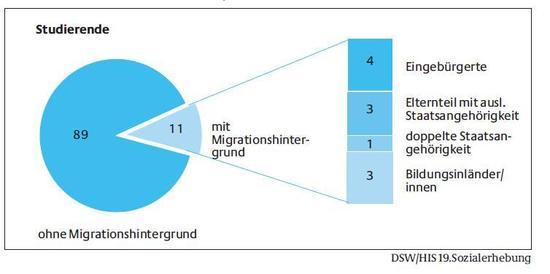Students with a migration background/experience
The cultural diversity of the students has increasingly become a feature of ordinary life at an international university like Freie Universität Berlin. According to the 19th social survey of the German National Association for Student Affairs of 2009, 11% of the students have a migration background. This figure includes students who are German citizens and who were naturalized (4%), of whom at least one parent is a foreign citizen (3%) or who have a second citizenship in addition to the German one (1%). Foreign Bildungsinländer (students with a German Abitur certificate, including from recognized German schools abroad) are also included in this group.
Students by migration status (in %)

A definition of the term “migration background” that is applicable to the federal state of Berlin is contained in Section 2 of the “Gesetz zur Regelung von Partizipation und Integration in Berlin (PartIntG) vom 28.12.2010”.
A large number of students with a migration background/experience are found especially in the teaching degree courses. According to a survey recently carried out by the “Zentrum für Lehrerbildung” of Freie Universität Berlin, 24.5% of the bachelor students in the classes qualifying for a teaching degree who enrolled in the winter semester 2011/12 have a migration background/experience. These figures underline the interaction between the requirements of globalized job markets on the one hand and the expectations and needs of an increasingly diverse student body on the other: One major task of academic education is to convey and foster competencies with regard to various languages and cultures, everyday realities and structures, philosophies and religious backgrounds.
The groups of naturalized citizens and the “Bildungsinländer” are faced with particular realities of everyday life, e.g. a mixture of components such as a lower level of German language skills, multilingualism, transnational biographies or high intercultural competency. However, it is striking that 34% of them stem from low-income and less educated families, a figure that is three times as high as the number of students without a migration background/experience (13%). In addition, a higher share of these students needs support under the German Federal Education Assistance Act (BAföG), from grants and/or own income and lives in the family of origin, a fact that allows us to draw conclusions on the family duties they have (19. Sozialerhebung des Deutschen Studentenwerks).
Moreover, job market surveys have shown that graduates with a migration background/experience have more difficulty entering into the job market in spite of good degrees (Klees-Möller/Tarzi, Wolff-Bendik 2007).
With regard to their intellectual performance, students with a migration background/experience are equal to other students and particularly those students from less educated families show a lot of commitment and ambition. However, just like students from non-academic families, they are often faced with greater challenges as they are less familiar with the academic sphere. These challenges are:
- demonstration of their skills, e.g. in discussions;
- preparation for and passing examinations;
- scheduling the studies for the next several weeks or months / the next semester;
- initiation of internships or semesters abroad;
- application for tutorials or student assistant jobs;
- intention to earn a doctorate degree.
For many of these students, taking up studies is not so much natural but rather a step into the unknown. Lacking financial and/or moral support by the parents, reservations against the benefit of an academic degree, family duties or the need of funding may affect the study progress severely. This becomes obvious above all in periods of transition between school, university and professsional life / doctorate. Here, they often lack adequate role models as well as support by the family with regard to academic working, organizational matters or subsequent entry into professional life. One frequent consequence of the autonomous educational management of students with a migration background/experience is that they tend to equating failures with the perception of their own insufficiency (Wojciechowicz 2010).
The following measures help you to support and integrate these students
- React sensitively to any kind of racism and “cultural hostility” with regard to the language used and group dynamics perceived;
- Make sure to benefit from the individual intercultural competency of the students for workgroups, text interpretations, etc.;
- Offer flexible attendance to students who have to work to finance their studies and refer students to the advice and counseling services informing about funding options (see below);
- Ask the students affected to hold presentations or to give support for the organization of the class in order to foster role models;
- Give clear and transparent instructions for the preparation and execution of examinations, if necessary in writing;
- Offer advice for scheduling the course (e.g. for the next two semesters);
- Encourage students to plan stays abroad and complementary studies;
- Encourage students to speak in public; foster work in groups because it is easier to overcome one’s inhibitions here;
- Confirm students that the university is exactly the right place for them, that they have opted for the right course and that they are able to perform as required;
- Inform about services offered by FU Berlin and other institutions to support students (see “Advice Centers”);
